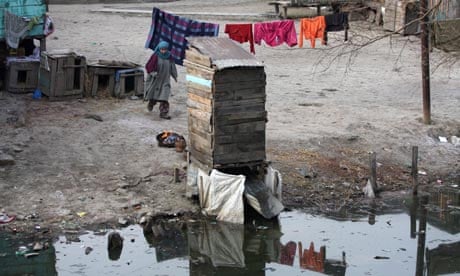Clean toilets have an important role in saving lives and boosting economic growth; that will be the message as 60 finance and development ministers gather in Washington on Friday at a high-level meeting on sanitation and water.
Their aim is to agree on urgent action towards ensuring that access to sanitation and safe drinking water becomes a reality for the billions of people lacking such basic services.
The Sanitation and Water for All (SWA) meeting, convened by Anthony Lake, executive director of the UN children's fund Unicef, follows an announcement in March by Unicef and the World Health Organisation that the world had met the millennium development goal (MDG) overall target for access to safe drinking water in 2010, but that 783 million people were still missing out.
The UN report also said that the target for access to improved sanitation – calling for 75% of the world to be covered – will not be met by 2015. At current rates of progress, the target would not be reached until 2026, making the target for sanitation one of the MDGs that is most off-track. Around 2.5 billion people still lack basic sanitation, the report said.
The NGO WaterAid said most developing countries are seriously off-track and, unless urgent action is taken, sub-Sahara will not meet the target for more than 150 years.
"This lack of basic facilities to hygienically dispose of human faeces is the primary cause of diarrhoeal diseases, which kill thousands of children around the world every single day," said WaterAid.
The high-level meeting before the weekend World Bank spring meetings is expected to call on world leaders to keep their promises and to support the 57 countries currently most off-track to achieve their MDG targets for sanitation. WaterAid estimates that if these countries achieve their MDG targets for sanitation by 2015, at least 400,000 additional children's lives would be saved.
In addition to saving lives, research on the economics of sanitation and water indicates that no other single intervention brings greater public health returns; that the annual economic impact of poor sanitation is more than 5-6% of GDP in some countries, including costs related to premature deaths, as well as losses in industry, tourism and health-related productivity. A 2011 World Bank study, for example, shows that India alone loses $53.8bn annually due to poor sanitation and hygiene.
A UN inter-agency report earlier this month said developing countries suffer from a chronic lack of technicians and staff to operate and maintain sanitation and drinking water infrastructure, and called for additional and more targeted resources to maintain routine operations of existing systems and services.
Aid commitments for water and sanitation rose from $7.5bn in 2008 to $7.8bn in 2010, a 3.2% increase. Aid commitments to sanitation and drinking water, however, lag behind aid for most social sectors, reflecting its low status when it comes to development. Education aid, for example, reached 13.3bn in 2010, while aid for health was $19.5bn.
"Sanitation is the big taboo in international development. Diarrhoeal disease is the biggest killer of children in Africa. At current rates of progress, we won't reach the MDG for sanitation on the continent for over two centuries. This meeting is a huge opportunity for finance ministers and donors to address a major neglect in aid policy," said Henry Northover, head of policy at WaterAid. "We need a doubling of aid spend to increase the numbers of people getting access to safe water and sanitation. This must to go hand in hand with strengthening government capacity so that aid money gets turned into sustainable services. Access to water and sanitation is indispensable for human development and reaching all the MDGs."
